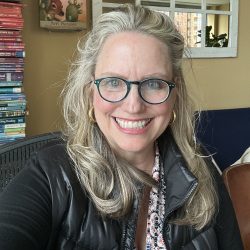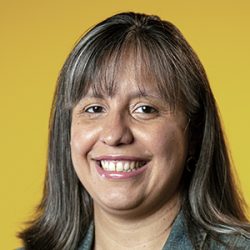Contact Us
-
Graduate Admissions212-875-4404
-
Director, Early Childhood and Childhood Special Education Programs OnlineAffiliated Faculty, Straus Center for Young Children & Families
-
Program Director, Bilingual/Dual Language, TESOL, and Childhood Special Education Programs
Childhood Special and General Education Dual Certification (On Campus or Online)
MSEd
-
Program Overview
The Childhood Special and General Education Dual Certification program prepares students to be model teachers in diverse settings.
This program is for prospective and current teachers who wish to work with children in grades 1 through 6. As a student in this program, you will have the flexibility to work in a range of settings and engage all children. This includes children from diverse racial, ethnic, socioeconomic, and linguistic backgrounds. This also includes children with a variety of social, emotional, behavioral, physical, and cognitive variations. You will:
- Construct developmentally responsive learning experiences that encourage all learners to follow their curiosities.
- Create accessible curricula so all learners can explore literacy, literature, mathematics, science, arts, and social studies content.
- Develop a strong social justice focus in order to advocate for and with children and families.
- Plan for dynamic and collaborative partnerships with families and school professionals.
- Engage in critical explorations of yourself, others, and the wider world.
This program culminates in a Master of Science in Education and requires 52 credits. This program is offered either on campus or fully online.
Due to the cohort nature of this program, students are not permitted to transfer into the online program once they have begun coursework in an on-campus program.
-
Admissions & Tuition
This program has options to begin in the fall, spring, and summer.
The summer and fall applications are currently open.
Students may apply for either the online or on campus options, and once selected, must remain in that modality until the completion of the program. Due to the cohort nature of the online program, students are not permitted to transfer into the online program once they have begun coursework in an on campus program.
Application Deadlines
- Applications are reviewed in rounds to ensure you receive a timely decision.
- You will have five business days after the application deadlines to finish providing any missing required materials. Incomplete applications will be moved to the next round for consideration.
- In some cases, applications submitted after the final deadline will be reviewed on a space available basis.
- We strongly encourage you to submit your application as early as possible. This guarantees the most timely admissions decision and the broadest consideration for scholarships and financial aid.
Summer 1 & Summer 2 (On Campus) | Summer Long (Online)
Round Application Deadline Materials Deadline Decisions Release 1 January 2, 2026 January 7, 2026 February 4, 2026 2 February 1, 2026 February 6, 2026 March 2, 2026 3 March 1, 2026 March 6, 2026 April 2, 2026 Fall (On Campus and Online)
Round Application Deadline Materials Deadline Decisions Release 1 February 1, 2026 February 6, 2026 March 2, 2026 2 March 1, 2026 March 6, 2026 April 2, 2026 3 April 1, 2026 April 6, 2026 May 4, 2026 Admissions Criteria
No prior teaching certification is necessary for this program.
Please review How to Apply for full details on the application process, admissions criteria, and application requirements.
Tuition
At Bank Street, tuition is charged per credit. The Childhood Special and General Education Dual Certification program requires 52 credits for completion. Read more on our Tuition page
Financial Aid
The majority of Bank Street students receive some type of financial aid. We strongly recommend applying early and submitting your FAFSA at the time you apply for the broadest consideration for scholarships and financial aid. Read more on our Financial Aid page
Technology Requirements
Students participating in the online program must secure access to the following required technology for all online courses:
- A personal computer with:
- Broadband Internet access
- Speakers, microphone, and camera
- Headphones, if participating from a public or shared space
- An updated version of the Chrome or Firefox browser and a free Zoom account
- For Supervised Fieldwork: A recording device (such as a smartphone, laptop, iPad, or camcorder) suitable for use in classrooms
These are required components of your program. It is your responsibility to ensure you have access to each item on this list. Bank Street does not provide or lend access to these devices and platforms.
-
Curriculum & Courses
-
Supervised Fieldwork
Supervised fieldwork/advisement lies at the heart of a Bank Street education. Through sustained experiences in the field, supervision from core faculty, and close collaboration with peers, our graduate students develop the ability to connect theory to practice and to reflect deeply on their own growth as educators. In this program, you will:
- Be supervised by your advisor, a core graduate faculty mentor and experienced teacher, who will virtually visit you in your classroom once each month.
- Participate in a weekly conference group of 5-7 students and your advisor. This will take place synchronously on Zoom if you are part of the online program.
- Reflect on a lesson with your advisor once each month. This will take place synchronously on Zoom if you are part of the online program.
- Meet individually with your advisor once each month. This will take place synchronously on Zoom if you are part of the online program.
- Construct artifacts to help you take a deeper look at the setting and students you work with.
You will work in classroom settings as a head teacher, assistant teacher (full-time), or as a student teacher (3 days each week). In our online programs, all advisement happens virtually via Zoom either in your classroom or by recording your practice.
- As a student teacher we will place you in two settings throughout the year. You will experience 2 age bands (grades 1-3 and grades 4-6), general and special education, and a public, high-needs environment.
- As a working head or assistant teacher you will use your own classroom as your fieldwork. We will place you in a different setting during the spring or summer semester to give you additional experience in a second setting.
-
Certification & Careers
Certification
When you successfully complete the program, you will receive a master’s degree and be eligible for New York State certification in Childhood Education, Grades 1-6 and Students with Disabilities, Grades 1-6, provided you complete all other State certification requirements. Read more on our Certification page
Careers
After graduation, students pursue a range of career opportunities including:
- Teaching in general education, special education, or inclusion classrooms in public, charter, and independent schools.
- Tutoring or working as learning specialists in schools or in private practice.
- Working in special education teacher support services (SETSS) roles.
Students at Bank Street have full access to our robust Career Services, including the CareerConnect job site, opportunities to attend job fairs and workshops, and connections to our alumni network nationwide.
-
Faculty
 Pamela JonesSupervised Fieldwork Advisor & Course Instructorpjones@bankstreet.edu 212-875-4660
Pamela JonesSupervised Fieldwork Advisor & Course Instructorpjones@bankstreet.edu 212-875-4660 Nesta MarshallSupervised Fieldwork Advisor & Course Instructornmarshall@bankstreet.edu 212-875-4559
Nesta MarshallSupervised Fieldwork Advisor & Course Instructornmarshall@bankstreet.edu 212-875-4559 Sean O’SheaSupervised Fieldwork Advisor & Course Instructorsoshea@bankstreet.edu 212-875-4486
Sean O’SheaSupervised Fieldwork Advisor & Course Instructorsoshea@bankstreet.edu 212-875-4486 Susie RolanderContent Specialist, Supervised Fieldwork Advisor, Course Instructorsrolander@bankstreet.edu 917-751-3415
Susie RolanderContent Specialist, Supervised Fieldwork Advisor, Course Instructorsrolander@bankstreet.edu 917-751-3415 Elizabeth Silva DiazProgram Director, Bilingual/Dual Language, TESOL, and Childhood Special Education Programsesilva@bankstreet.edu
Elizabeth Silva DiazProgram Director, Bilingual/Dual Language, TESOL, and Childhood Special Education Programsesilva@bankstreet.edu

Complete Our Childhood Special and General Education Program Online!
Our 100% online courses provide the flexibility you need to balance work and school. Sustained on-site experiences supported by core faculty supervision and close collaboration with peers connect theories learned in online courses to practice in real-world classroom settings.
This powerful combination of online learning and hands-on application allows you to develop the tools to truly engage children, providing a learning experience that pushes boundaries and positively impacts students, families, and their communities.
The Bank Street Experience
GSE alum, Chiara DiLello ’16, talks about the Bank Street experience.
-
TranscriptTranscript Prompt: What makes you feel like a Bank Street Teacher? Chiara: I feel like a Bank Street teacher every time I’m kind of walking around my room, maybe with a clipboard, jotting down notes of what people are doing, or asking somebody about a math problem, like, “How do you know that?”, “What do you think?” Um, or looking at a piece of art with kids and saying, “What do you see that makes you say that?” Um, I feel like a Bank Street teacher in my setting every time we look at artifacts, like digital ones online or we go on a fieldtrip—every time we go on a fieldtrip, I feel like a Bank Street teacher. Prompt: Can you talk about a course you took at Bank Street that still impacts you today? Chiara: When you sit in Developmental Variations and learn about different kinds of minds and different strengths that in a school would get called “disabilities,” I mean that’s something that really changes how you see people, and possibly also yourself. And how are you going to meet people as people and meet people where they are. And by people I mean students, I mean kids. When we say social studies as the core of the curriculum for learners with special needs, that’s gotta be true. That’s a wonderful, amazing thing to make true because it becomes the backbone of everything else, and that’s where you build community and where you learn about the world and bring your own thinking and opinions to bear, and you use evidence, and you practice writing, and you look at art and artifacts and maps, and it just weaves everything into this really integrated experience. Prompt: Why did you come to Bank Street? Chiara: I came to Bank Street for Special Education because of that model of thinking, what do people bring, what do individuals bring to the classroom. Not, what box am I gonna put a kid in because of what they can or can’t do, but how am I going to make my classroom a place where all learners can thrive? Prompt: What does “advocating” mean to you? Chiara: It’s the combination of, how are we advocating for students? So, the students we teach and the students we are as grad students. How are we teaching students to advocate for themselves? And then, how are we also—I’ve seen the school do this more when I was a graduate student and since graduating—but how do we also make a place for ourselves in the world of education, which people are constantly trying to reinvent and prescribe things for, how do we get out there and say, actually, what can take you very far—we’re not going to say it’s right for everyone everywhere—but what can take you very far is this idea that children are whole people and they can do great things when you put life in front of them. And take them on their way, and help them grow through all of those things that they encounter. Advocating for that is something that I really love about Bank Street and I want to spread that around.



